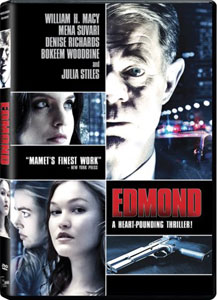William H. Macy gives the most daring and possibly best performance of his career in “Edmond” (2005), David Mamet’s adaptation of his own play, directed by Stuart Gordon. Set in New York City, the film hooked me immediately by starting off like a darker “Office Space,” as Macy’s dead-eyed title character stumbles out of an indeterminate white-collar job he hates, has a fortune teller inform him he’s living the wrong life, and goes home and breaks up with his wife (Rebecca Pidgeon), noting that he hasn’t been happy in the marriage in years.
Edmond brushes aside conventions
Mamet immediately has us rooting for Edmond because – like “Office Space’s” Peter Gibbons – he brushes aside conventions of what you’re supposed to do (and not do). But he has also ingeniously tricked us: We may admire Edmond’s crazy, brave actions (having naturally assumed his job and wife are awful), but we don’t know anything about him beyond that.
By “Edmond’s” end, we’ve been brought into the psyche of the type of person we’d dismiss as a deranged criminal if we read a newspaper account of his behavior. And the message, disturbingly, is that the only line between Edmond and normalcy is that he chooses to commit a bad act – and he himself can’t supply a reason for why he makes that choice.

“Edmond” (2005)
Director: Stuart Gordon
Writer: David Mamet
Stars: William H. Macy, Julia Stiles, Joe Mantegna
Before the film gets to that point – which will lose some viewers, and admittedly it almost lost me – it’s darkly comedic to watch Edmond walk through the sidewalks of NYC at night, being told by various hucksters and flesh-peddlers that they can get him what he wants. Amusingly, he’s a fish out of water in these situations, but the pimps, strippers and hookers always take him at face value.
There are no less than four straight-up conversations where Edmond haggles over the price of a sex act (Mena Suvari, Denise Richards and Bai Ling have memorable small roles) and gets into the economics of the trade. These are conversations not allowed by societal rules, but Mamet says what the heck, let’s imagine such a thing anyway. So we learn about the internal economics of strip clubs, whore houses, etc.
That said, this isn’t entirely a trip into a comedic fantasy land, because Edmond encounters the worst aspects of Big Apple crime and rudeness. He asks to see a hustler’s cards and gets beaten up and robbed, and he can’t make a phone call to get money because he has no money.
Seeking the meaning of life
From the start of this journey, Edmond has sought the ephemeral meaning of life (or perhaps the path to happiness), with a fellow bargoer (Joe Mantegna) outlining some the things that give life meaning. It seems like this aspect of “Edmond” is really clicking into place when it steps back into fantasy land and cute waitress Glenna (Julia Stiles) takes Edmond up on his invitation to have intercourse with him.
Maybe his luck is turning, we think. But then “Edmond” itself takes that wild turn entering the third act wherein it either runs off the rails or chugs toward a final, grim statement.
“Edmond” makes me wonder if it is a parable, perhaps based on a religious figure. Or it could be making a grand statement on bigotry. Mantegna’s bargoer has open prejudices against black people, and Glenna hates gay people; those can’t be random details.
Edmond tries hard – much harder than Peter Gibbons – to find the ephemeral “what he wants,” but in this case it doesn’t work out. In that sense, a viewer is left with disappointment and emptiness for this man we’ve followed for 82 minutes. At the same time, “Edmond” – especially in its first two acts — is relentlessly (if weirdly) entertaining, and it leaves that “What was it about?” aftertaste that makes you want to find someone to discuss the film with.


